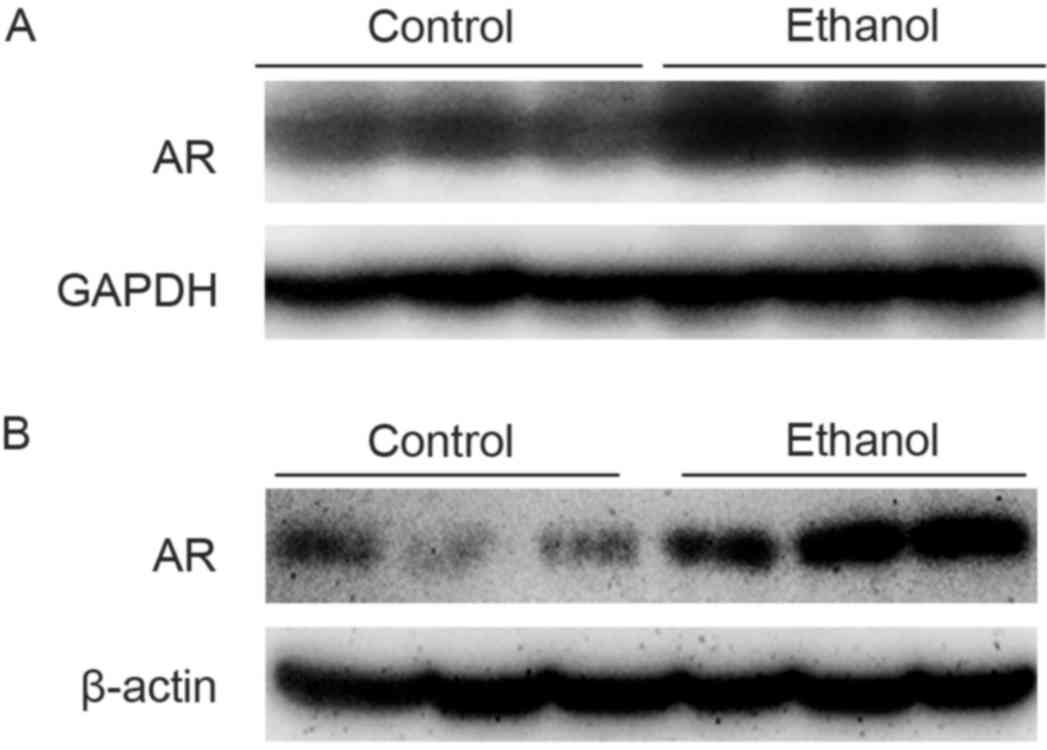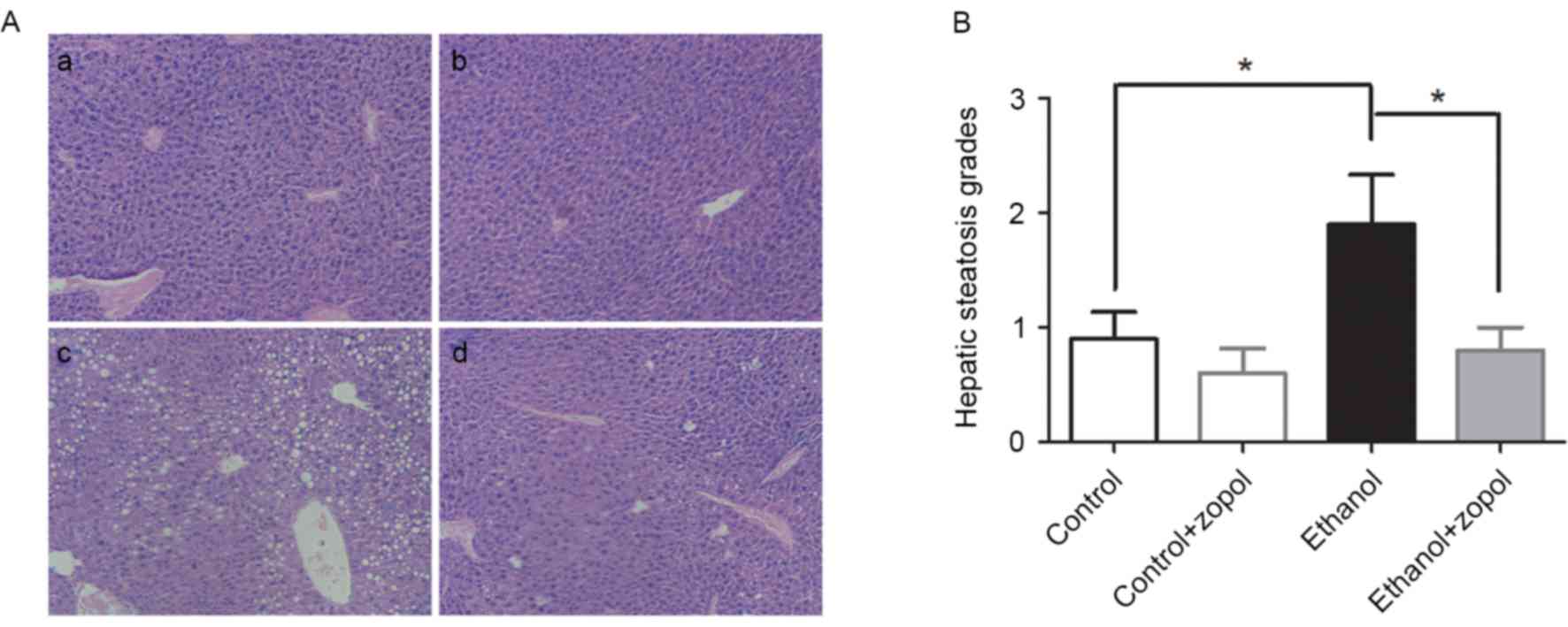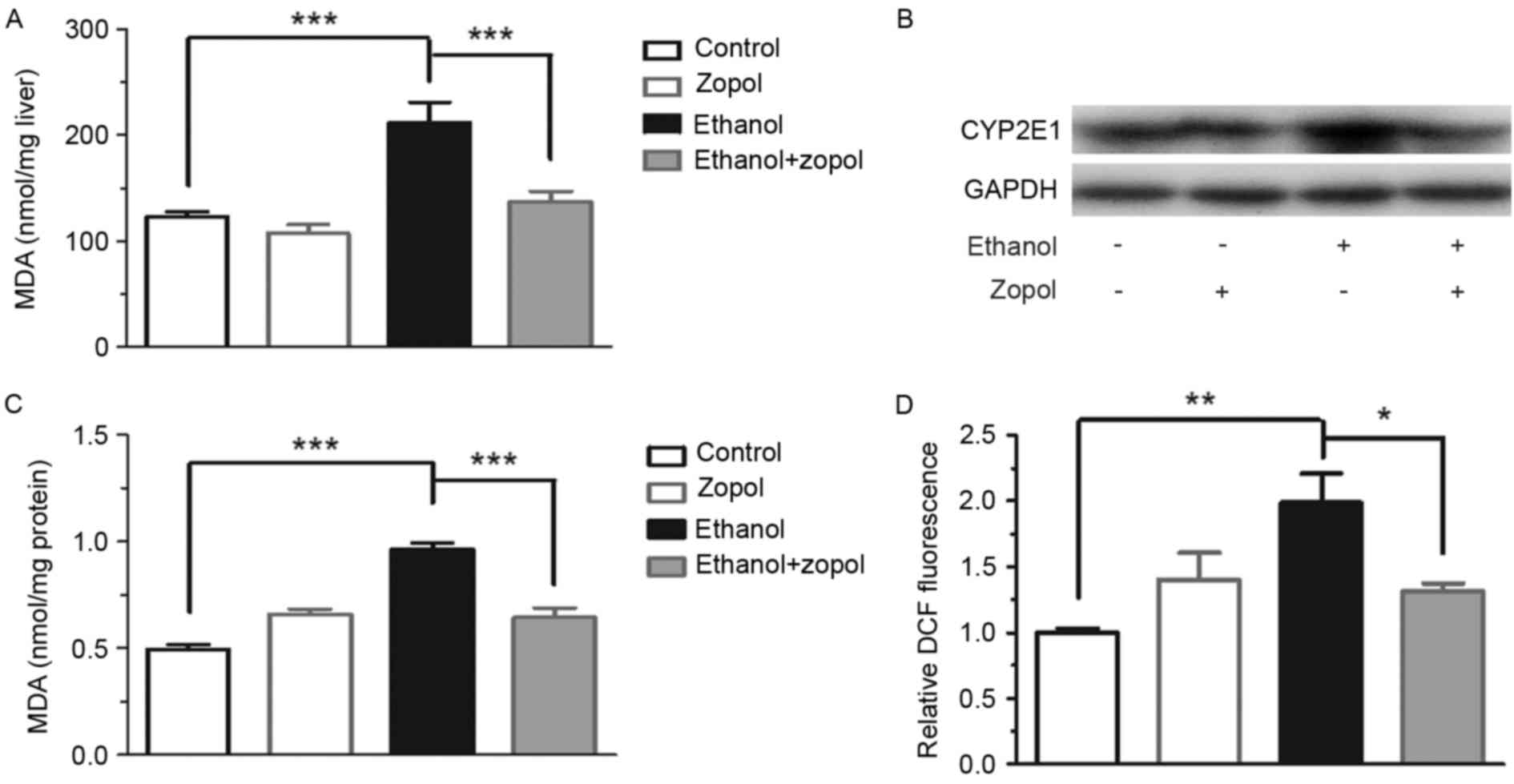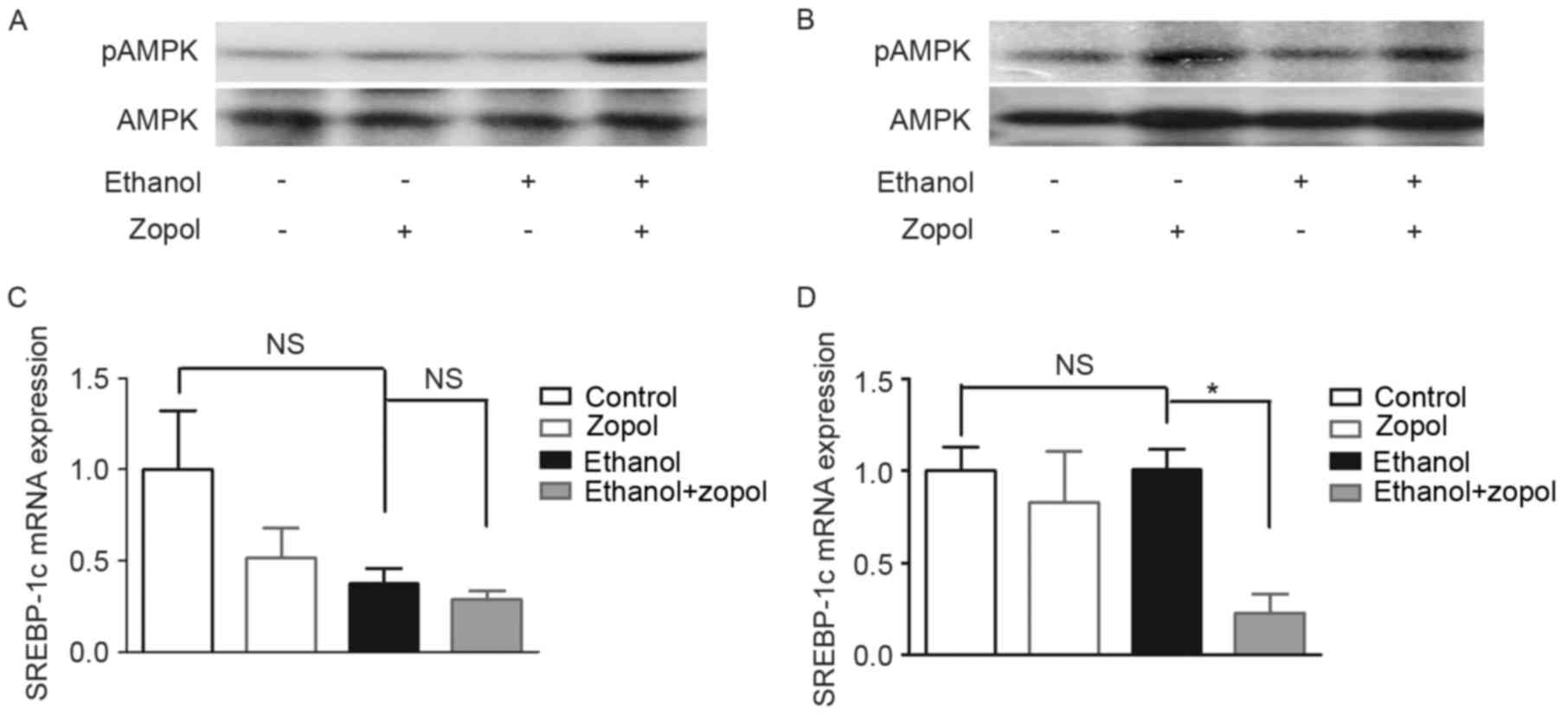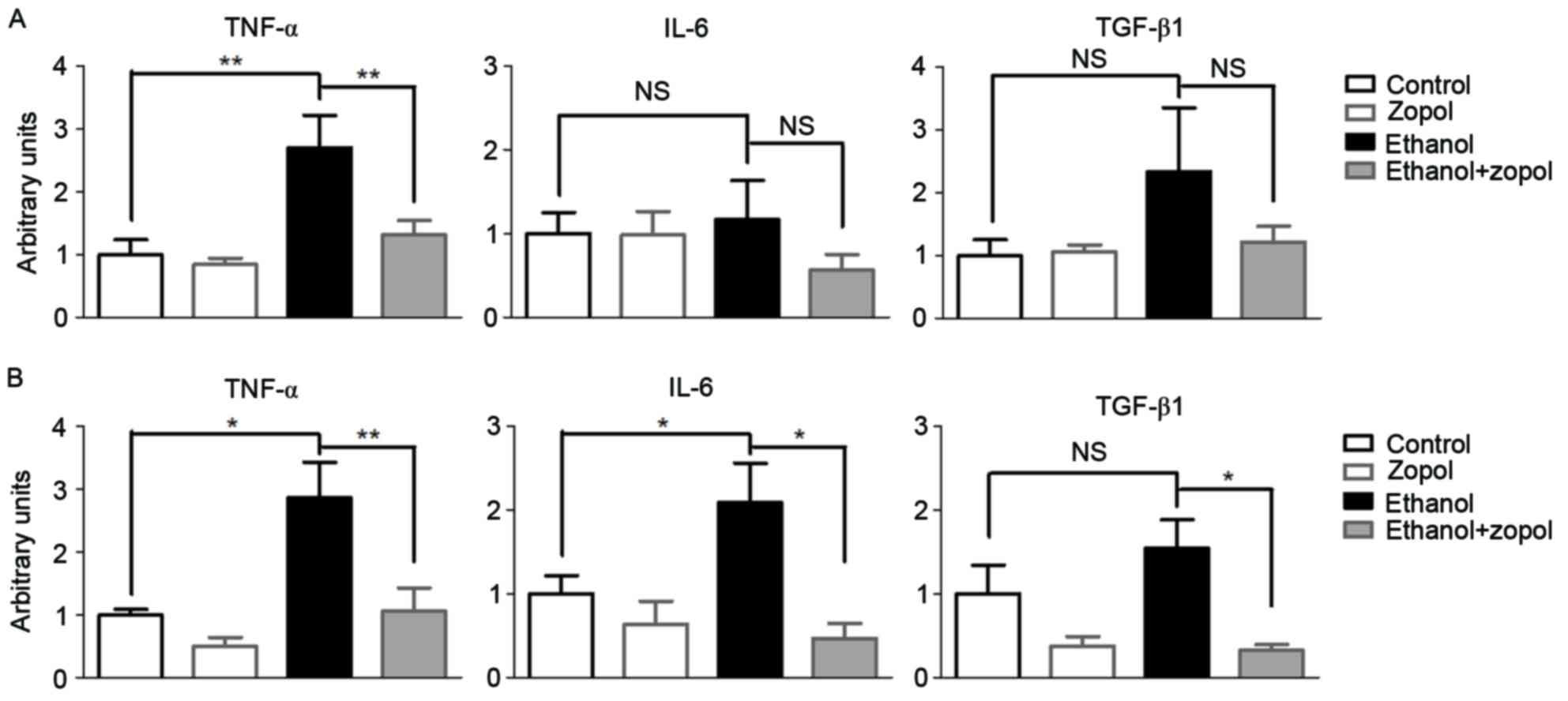|
1
|
Ishii H, Kurose I and Kato S: Pathogenesis
of alcoholic liver disease with particular emphasis on oxidative
stress. J Gastroenterol Hepatol. 12:S272–S282. 1997. View Article : Google Scholar : PubMed/NCBI
|
|
2
|
Kawaratani H, Tsujimoto T, Douhara A,
Takaya H, Moriya K, Namisaki T, Noguchi R, Yoshiji H, Fujimoto M
and Fukui H: The effect of inflammatory cytokines in alcoholic
liver disease. Mediators Inflamm. 2013:4951562013. View Article : Google Scholar : PubMed/NCBI
|
|
3
|
Hers HG: Aldose reductase. Biochim Biophys
Acta. 37:120–126. 1960.(In French). View Article : Google Scholar : PubMed/NCBI
|
|
4
|
Nishimura-Yabe C: Aldose reductase in the
polyol pathway: A potential target for the therapeutic intervention
of diabetic complications. Nihon Yakurigaku Zasshi. 111:137–145.
1998.(In Japanese). View Article : Google Scholar : PubMed/NCBI
|
|
5
|
Brown KE, Broadhurst KA, Mathahs MM,
Kladney RD, Fimmel CJ, Srivastava SK and Brunt EM: Immunodetection
of aldose reductase in normal and diseased human liver. Histol
Histopathol. 20:429–436. 2005.PubMed/NCBI
|
|
6
|
O'Connor T, Ireland LS, Harrison DJ and
Hayes JD: Major differences exist in the function and
tissue-specific expression of human aflatoxin B1 aldehyde reductase
and the principal human aldo-keto reductase AKR1 family members.
Biochem J. 343:487–504. 1999. View Article : Google Scholar : PubMed/NCBI
|
|
7
|
Qiu L, Lin J, Xu F, Gao Y, Zhang C, Liu Y,
Luo Y and Yang JY: Inhibition of aldose reductase activates hepatic
peroxisome proliferator-activated receptor-α and ameliorates
hepatosteatosis in diabetic db/db mice. Exp Diabetes Res.
2012:7897302012. View Article : Google Scholar : PubMed/NCBI
|
|
8
|
Qiu L, Lin J, Ying M, Chen W, Yang J, Deng
T, Chen J, Shi D and Yang JY: Aldose reductase is involved in the
development of murine diet-induced nonalcoholic steatohepatitis.
PLoS One. 8:e735912013. View Article : Google Scholar : PubMed/NCBI
|
|
9
|
Chen T, Shi D, Chen J, Yang Y, Qiu M, Wang
W and Qiu L: Inhibition of aldose reductase ameliorates
diet-induced nonalcoholic steatohepatitis in mice via modulating
the phosphorylation of hepatic peroxisome proliferator-activated
receptor α. Mol Med Rep. 11:303–308. 2015.PubMed/NCBI
|
|
10
|
Peng Z, Borea PA, Varani K, Wilder T, Yee
H, Chiriboga L, Blackburn MR, Azzena G, Resta G and Cronstein BN:
Adenosine signaling contributes to ethanol-induced fatty liver in
mice. J Clin Invest. 119:582–594. 2009. View Article : Google Scholar : PubMed/NCBI
|
|
11
|
Livak KJ and Schmittgen TD: Analysis of
relative gene expression data using real-time quantitative PCR and
the 2(−Delta Delta C(T)) method. Methods. 25:402–408. 2001.
View Article : Google Scholar : PubMed/NCBI
|
|
12
|
Lieber CS, DeCarli LM and Sorrell MF:
Experimental methods of ethanol administration. Hepatology.
10:501–510. 1989. View Article : Google Scholar : PubMed/NCBI
|
|
13
|
Leung TM and Nieto N: CYP2E1 and oxidant
stress in alcoholic and non-alcoholic fatty liver disease. J
Hepatol. 58:395–398. 2013. View Article : Google Scholar : PubMed/NCBI
|
|
14
|
Lu Y and Cederbaum AI: CYP2E1 and
oxidative liver injury by alcohol. Free Radic Biol Med. 44:723–738.
2008. View Article : Google Scholar : PubMed/NCBI
|
|
15
|
You M, Matsumoto M, Pacold CM, Cho WK and
Crabb DW: The role of AMP-activated protein kinase in the action of
ethanol in the liver. Gastroenterology. 127:1798–1808. 2004.
View Article : Google Scholar : PubMed/NCBI
|
|
16
|
Sid B, Verrax J and Calderon PB: Role of
AMPK activation in oxidative cell damage: Implications for
alcohol-induced liver disease. Biochem Pharmacol. 86:200–209. 2013.
View Article : Google Scholar : PubMed/NCBI
|
|
17
|
Barry RE: Role of acetaldehyde in the
pathogenesis of alcoholic liver disease. Br J Addict. 83:1381–1386.
1988. View Article : Google Scholar : PubMed/NCBI
|
|
18
|
Vander Jagt DL and Hunsaker LA: Substrate
specificity of reduced and oxidized forms of human aldose
reductase. Adv Exp Med Biol. 328:279–288. 1993. View Article : Google Scholar : PubMed/NCBI
|
|
19
|
Vander Jagt DL, Kolb NS, Vander Jagt TJ,
Chino J, Martinez FJ, Hunsaker LA and Royer RE: Substrate
specificity of human aldose reductase: Identification of
4-hydroxynonenal as an endogenous substrate. Biochim Biophys Acta.
1249:117–126. 1995. View Article : Google Scholar : PubMed/NCBI
|
|
20
|
Zhang C, Huang C, Tian Y and Li X: Polyol
pathway exacerbated ischemia/reperfusion-induced injury in
steatotic liver. Oxid Med Cell Longev. 2014:9636292014. View Article : Google Scholar : PubMed/NCBI
|
|
21
|
Ruef J, Liu SQ, Bode C, Tocchi M,
Srivastava S, Runge MS and Bhatnagar A: Involvement of aldose
reductase in vascular smooth muscle cell growth and lesion
formation after arterial injury. Arterioscler Thromb Vasc Biol.
20:1745–1752. 2000. View Article : Google Scholar : PubMed/NCBI
|
|
22
|
Tracey WR, Magee WP, Ellery CA, MacAndrew
JT, Smith AH, Knight DR and Oates PJ: Aldose reductase inhibition
alone or combined with an adenosine A (3) agonist reduces ischemic
myocardial injury. Am J Physiol Heart Circ Physiol.
279:H1447–H1452. 2000.PubMed/NCBI
|
|
23
|
Morimoto M, Hagbjörk AL, Nanji AA,
Ingelman-Sundberg M, Lindros KO, Fu PC, Albano E and French SW:
Role of cytochrome P4502E1 in alcoholic liver disease pathogenesis.
Alcohol. 10:459–464. 1993. View Article : Google Scholar : PubMed/NCBI
|
|
24
|
Viollet B, Guigas B, Leclerc J, Hébrard S,
Lantier L, Mounier R, Andreelli F and Foretz M: AMP-activated
protein kinase in the regulation of hepatic energy metabolism: From
physiology to therapeutic perspectives. Acta Physiol (Oxf).
196:81–98. 2009. View Article : Google Scholar : PubMed/NCBI
|
|
25
|
An L, Wang X and Cederbaum AI: Cytokines
in alcoholic liver disease. Arch Toxicol. 86:1337–1348. 2012.
View Article : Google Scholar : PubMed/NCBI
|
|
26
|
McClain CJ and Cohen DA: Increased tumor
necrosis factor production by monocytes in alcoholic hepatitis.
Hepatology. 9:349–351. 1989. View Article : Google Scholar : PubMed/NCBI
|
|
27
|
Endo M, Masaki T, Seike M and Yoshimatsu
H: TNF-alpha induces hepatic steatosis in mice by enhancing gene
expression of sterol regulatory element binding protein-1c
(SREBP-1c). Exp Biol Med (Maywood). 232:614–621. 2007.PubMed/NCBI
|















